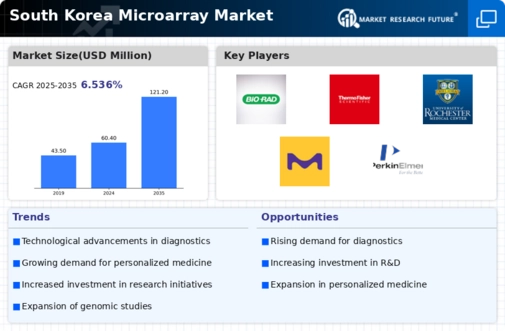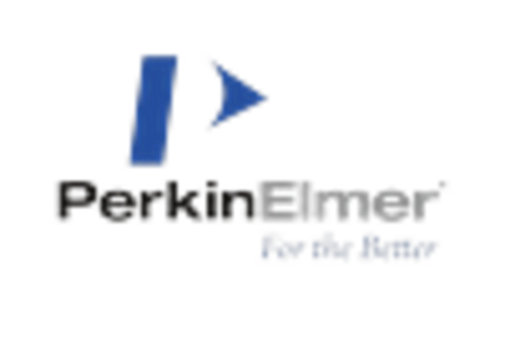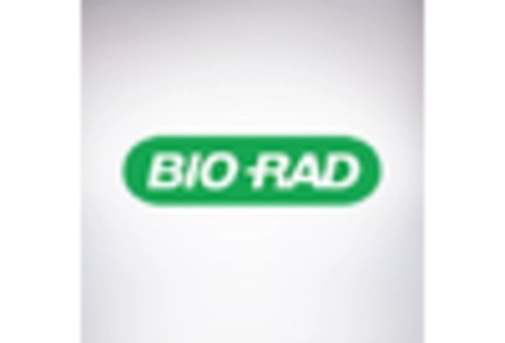Market Trends and Growth Projections
The Global South Korea Microarray Market Industry is characterized by various trends and growth projections. The market is expected to reach 750 USD Million in 2024 and is projected to grow to 1500 USD Million by 2035, reflecting a compound annual growth rate (CAGR) of 6.5% from 2025 to 2035. These figures indicate a robust expansion driven by technological advancements, increasing applications in personalized medicine, and government support. The market dynamics suggest a favorable environment for innovation and investment, positioning South Korea as a leader in the global microarray landscape.
Rising Demand for Personalized Medicine
The Global South Korea Microarray Market Industry experiences a notable surge in demand for personalized medicine. This trend is driven by advancements in genomics and biotechnology, which enable tailored treatment plans based on individual genetic profiles. As healthcare providers increasingly adopt microarray technology for genetic testing, the market is projected to reach 750 USD Million in 2024. This growth reflects a broader global shift towards precision medicine, where treatments are customized to enhance efficacy and minimize adverse effects. The integration of microarray data into clinical practice is likely to enhance patient outcomes and drive further investment in this sector.
Emerging Markets and Global Collaborations
Emerging markets and international collaborations are pivotal in shaping the Global South Korea Microarray Market Industry. As South Korea strengthens its position in the global biotechnology landscape, partnerships with international research institutions and companies are becoming increasingly common. These collaborations facilitate knowledge exchange and technology transfer, enhancing the capabilities of local firms. The expansion into emerging markets presents opportunities for growth, as demand for microarray technologies rises in regions with developing healthcare infrastructures. This dynamic environment is likely to foster innovation and drive market expansion, positioning South Korea as a key player in the global microarray sector.
Government Support and Funding Initiatives
Government support plays a crucial role in the growth of the Global South Korea Microarray Market Industry. Various initiatives aimed at promoting research and development in genomics and biotechnology have been established. For example, funding programs for academic institutions and private enterprises encourage innovation in microarray technologies. This financial backing not only accelerates research but also enhances collaboration between public and private sectors. As a result, the market is anticipated to witness substantial growth, potentially reaching 1500 USD Million by 2035. Such initiatives reflect a commitment to advancing healthcare and biotechnology sectors, positioning South Korea as a leader in microarray applications.
Increasing Applications in Cancer Research
The application of microarray technology in cancer research significantly propels the Global South Korea Microarray Market Industry. Microarrays enable researchers to analyze gene expression patterns associated with various cancers, facilitating the identification of biomarkers for diagnosis and treatment. As cancer prevalence continues to rise, the demand for effective diagnostic tools becomes paramount. The integration of microarray data into clinical oncology is likely to enhance personalized treatment strategies, thereby improving patient outcomes. This growing focus on cancer research is expected to contribute to the market's expansion, aligning with global trends in oncology and precision medicine.
Technological Advancements in Microarray Platforms
Technological innovations in microarray platforms significantly influence the Global South Korea Microarray Market Industry. Continuous improvements in sensitivity, specificity, and throughput of microarray technologies facilitate more accurate and efficient analyses. For instance, the introduction of next-generation sequencing and high-density microarrays enhances the ability to detect genetic variations and expression levels. These advancements are expected to contribute to a compound annual growth rate (CAGR) of 6.5% from 2025 to 2035. As researchers and clinicians increasingly rely on these sophisticated tools, the demand for advanced microarray solutions is likely to expand, fostering a competitive landscape.















